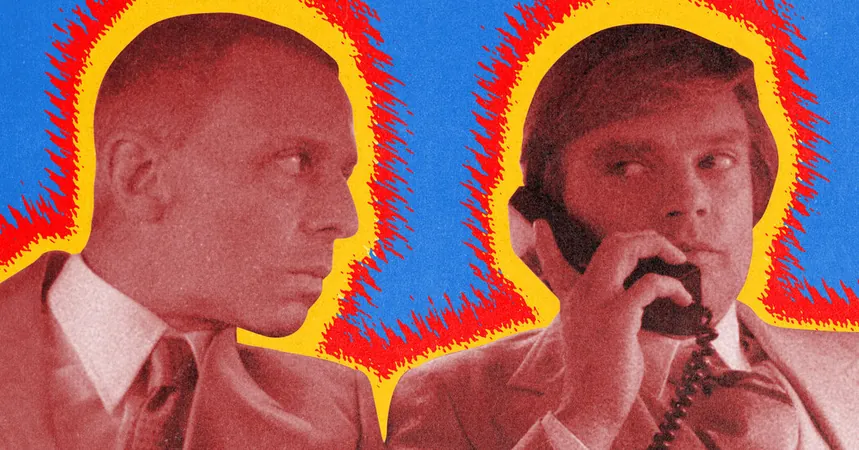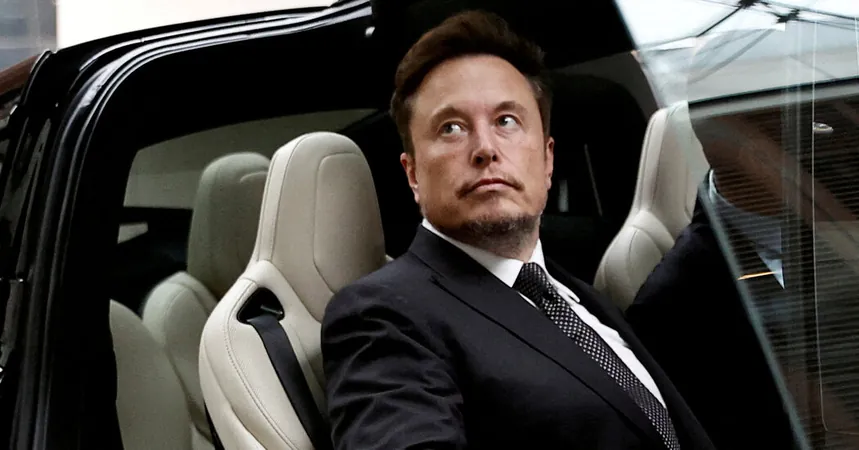
Unraveling the Truth Behind ‘The Apprentice’ and Donald Trump's Rise to Fame
2024-10-11
Author: Ming
Introduction
In a dramatic retelling of Donald Trump's early career, 'The Apprentice' encapsulates moments that shaped one of the most controversial figures in modern politics. Set in 1986, the film depicts a fictionalized encounter between Trump and an actor portraying a ghostwriter who would help craft 'The Art of the Deal,' a book that some now see more as a tale of ambition than a memoir rooted in factual recounting.
Themes Explored
The film's narrative artfully explores two main themes that reflect deep psychological truths about Trump, as taught by Tony Schwartz, the co-author of 'The Art of the Deal.' Schwartz, who has spent decades studying influential leaders, points to Trump's formative experiences and his ongoing struggles with identity and self-worth. According to him, Trump exemplifies two critical lessons: first, an absence of conscience can lead to significant power, while second, external achievements can never truly fill internal voids.
Familial Influence
Through the lens of familial and mentor influences, notably that of his father, Fred Trump, and notorious lawyer Roy Cohn, the film paints a picture of a man who's been shaped by traumatic and dysfunctional relationships. Fred Trump's harsh views on success left a significant mark on Donald, instilling in him a zero-sum perspective where vulnerability was not tolerated. This upbringing, combined with Cohn's cutthroat mentality, reinforced the idea that winning at all costs, regardless of moral implications, was paramount.
Artistic Liberties and Emotional Truth
While artistic liberties were taken in the presentation of Trump's story, the emotional truth resonates. The film reminds viewers that Trump’s rise to power wasn't solely about his business acumen but also a reflection of enduring familial scars and the trauma that shadowed his formative years. Schwartz recalls their late-night conversations, where Trump boasted of victories and achievements masking a precarious financial situation that many weren’t privy to at the time.
Insecurity and External Validation
As Schwartz observed, Trump's insatiable need for recognition highlights a deep-seated insecurity. His insistent thirst for attention can be traced back to a childhood devoid of unconditional love, where external validation became a crucial metric for self-worth. Trump's interactions and personal life seem a mirror of his early experiences, which, Schwartz argues, continue to haunt him today.
Cohn's Influence
The film delves into Trump's relationships further as it transitions from his father to Cohn. Cohn's brazen ethos — characterized by principles like 'attack, attack, attack' and an unwavering denial of defeat — mirrored the values Trump came to embrace. Although Cohn served as a mentor, his later abandonment by Trump demonstrates the transactional nature of their relationship, marking a stark representation of loyalty that only flowed in one direction.
Psychopathic Traits
Throughout the narrative, traits aligning with psychopathy become apparent, according to Schwartz. Characteristics of deceit, impulsivity, and a distinct lack of remorse echo throughout Trump's actions and decisions over the years, raising pertinent questions about his psychological makeup. This portrayal serves as both a warning and a deep inquiry into the man who currently occupies one of the highest offices in the world.
Conclusion
As the world gears up for a new election season, 'The Apprentice' stands not just as a reflection of Trump's past but a chilling reminder of the consistency in his character. The lessons drawn from the film extend beyond entertainment, inviting viewers to ponder the implications of leadership styles shaped by personal turmoil and the echoes of a troubled childhood. The warning is clear: the past is prologue, and it bears significant weight on the present.


 Brasil (PT)
Brasil (PT)
 Canada (EN)
Canada (EN)
 Chile (ES)
Chile (ES)
 España (ES)
España (ES)
 France (FR)
France (FR)
 Hong Kong (EN)
Hong Kong (EN)
 Italia (IT)
Italia (IT)
 日本 (JA)
日本 (JA)
 Magyarország (HU)
Magyarország (HU)
 Norge (NO)
Norge (NO)
 Polska (PL)
Polska (PL)
 Schweiz (DE)
Schweiz (DE)
 Singapore (EN)
Singapore (EN)
 Sverige (SV)
Sverige (SV)
 Suomi (FI)
Suomi (FI)
 Türkiye (TR)
Türkiye (TR)